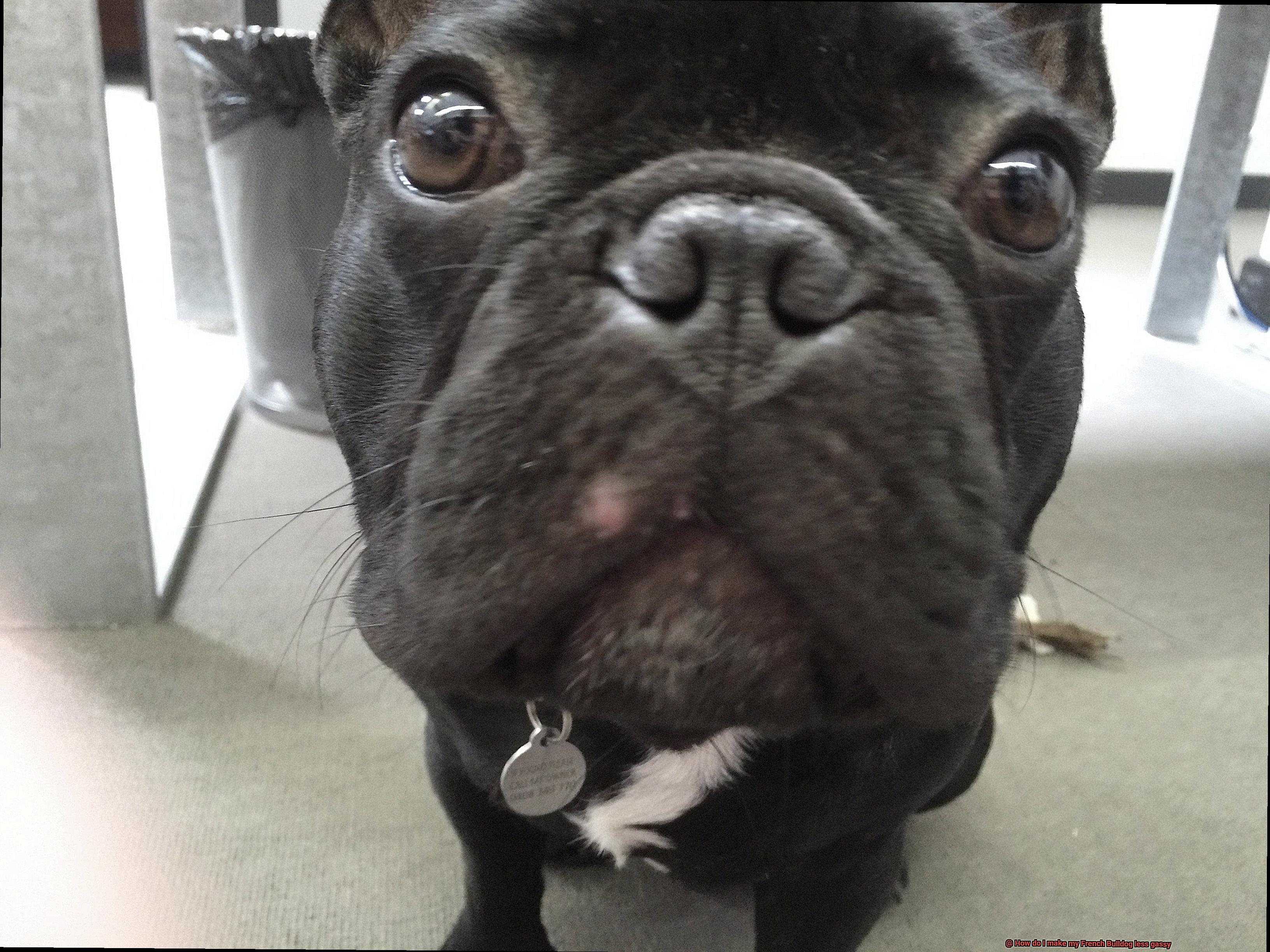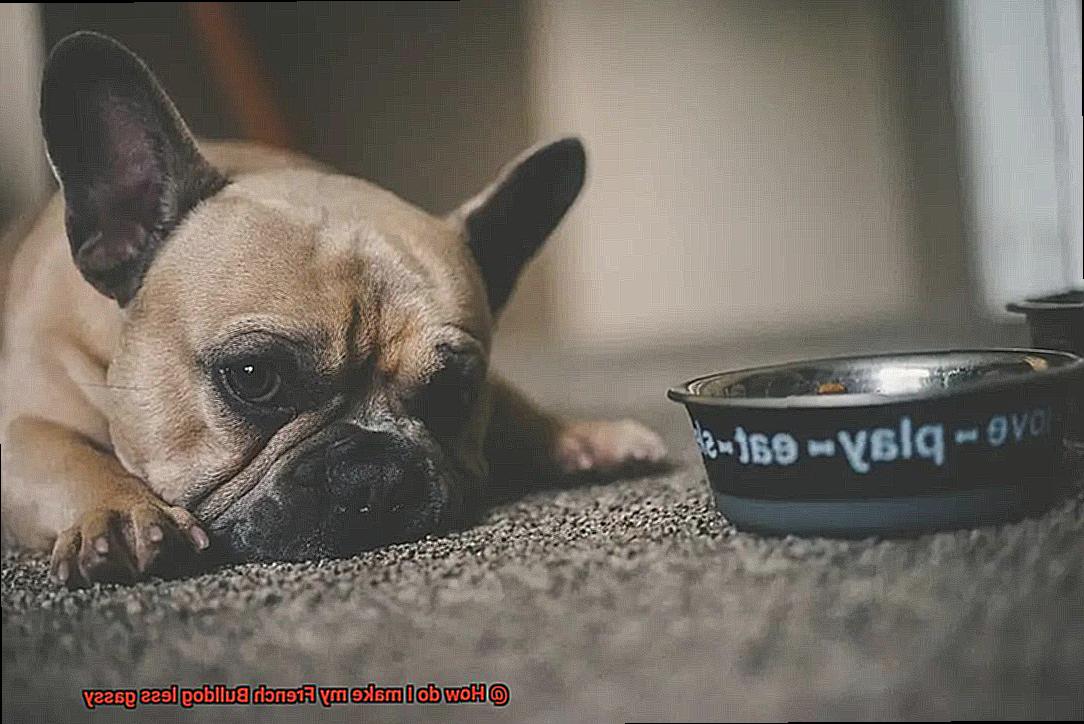How do I make my French Bulldog less gassy?
The French Bulldog – those little bundles of joy with their adorable bat-like ears and goofy personalities. They’ve stolen the hearts of dog lovers all over the globe. But let’s address the elephant in the room (or should I say, the gas cloud) – their notorious gassiness.
If you’ve ever had the misfortune of being trapped in a room with a gassy Frenchie, you know just how urgent it is to find a solution. Well, fear not. As an expert in all things doggy, I’m here to equip you with tips and tricks to tame your French Bulldog’s tummy troubles and restore peace to your home.
In this ultimate guide, we’ll dive deep into what causes those stinky farts in French Bulldogs and arm you with battle-tested strategies to combat this pungent problem head-on. From tweaking their diet to adopting savvy feeding practices and even exploring some home remedies, we’ll explore a range of approaches that will have your Frenchie farting less and feeling better overall.
So, grab a seat, kick back, and prepare to bid farewell to those noxious odors. Let’s embark on an adventure into the world of keeping your French Bulldog’s tummy happy and odor-free.
Evaluate Your Dog’s Diet
Contents
- 1 Evaluate Your Dog’s Diet
- 2 Feeding Routine for French Bulldogs
- 3 Incorporating Probiotics into Your Dog’s Diet
- 4 Pay Attention to Eating Habits
- 5 Avoid Table Scraps and Certain Foods
- 6 Stick to a Consistent Feeding Schedule
- 7 Regular Exercise for French Bulldogs
- 8 Consulting with a Veterinarian
- 9 Conclusion
French Bulldogs are known for their lovable personalities, but their excessive gas can sometimes put a damper on the fun. Evaluating your dog’s diet is a crucial step in addressing this issue and ensuring your Frenchie’s overall health and happiness. In this blog post, we will explore the importance of evaluating your dog’s diet, common causes of gas in French Bulldogs, and provide tips for success.
The Importance of Evaluating Your Dog’s Diet:

Evaluating your dog’s diet is essential for several reasons. It helps identify any potential allergens or sensitivities that may be causing digestive issues, such as excessive gas. Additionally, a high-quality diet ensures that your Frenchie receives the necessary nutrients for optimal health and energy levels.
Common Causes of Gas in French Bulldogs:
French Bulldogs are prone to gas due to their unique anatomy and sensitive digestive systems. Factors that contribute to excessive gas include swallowing air while eating, food allergies or sensitivities, and certain ingredients that are harder to digest. Identifying these causes can help you make informed choices about your Frenchie’s diet.
Tips for Evaluating Your Dog’s Current Diet:

Here are some practical tips for evaluating your Frenchie’s current diet:
- Read the ingredient list: Look for high-quality protein sources and avoid fillers like corn or soy.
- Consider specialized formulas: Opt for dog food specifically formulated for French Bulldogs or sensitive stomachs.
- Monitor portion sizes: Ensure you’re feeding the appropriate amount of food based on your Frenchie’s age, weight, and activity level.
- Evaluate feeding routine: Feed smaller meals throughout the day to prevent overeating and minimize air intake.
The Role of Food Allergies or Sensitivities:
Food allergies or sensitivities can contribute to excessive gas in French Bulldogs. Common allergens include grains, poultry, beef, and dairy. If you suspect your Frenchie has a food allergy, consider a limited ingredient diet or consult a veterinarian for further guidance.
The Benefits of a High-Quality, Easily Digestible Diet:
Feeding your Frenchie a high-quality, easily digestible diet has numerous benefits beyond reducing gas. It promotes a healthy coat, supports strong immunity, and maintains optimal weight. Look for dog foods with quality protein sources like chicken, fish, or lamb.
The Importance of Portion Control and Feeding Schedules:
Portion control and feeding schedules play a significant role in preventing gas. Avoid free-feeding and stick to regular mealtimes to establish a routine. This helps regulate digestion and prevents overeating, which can lead to excessive gas.
Feeding Routine for French Bulldogs
French Bulldogs are full of personality and charm, but one thing that can put a damper on their adorable qualities is excessive gas.

We all know how unpleasant it can be when your Frenchie lets one rip, and it seems like it’s happening more often than not. Establishing a consistent feeding routine can help manage their gassiness and keep the air fresh and clean.
Portion Control: Size Matters
The first step in managing your French Bulldog’s gas is determining the appropriate portion size. You don’t want to overfeed your furry friend, as it can lead to indigestion and increased gas production.

Consult with your veterinarian to calculate the ideal amount of food based on your dog’s age, weight, and activity level. Remember, portion control is key to keeping those gas bombs at bay.
Divide and Conquer: Mealtime Strategy
Once you’ve determined the right portion size, it’s time to divide it into two or three meals throughout the day. This helps prevent overloading your Frenchie’s sensitive digestive system and allows for better digestion and nutrient absorption. Think of it as conquering the gas battle one meal at a time.
Quality Matters: Choose Wisely
When it comes to choosing dog food for your French Bulldog, quality matters. Look for formulas that are easily digestible and free from common allergens like wheat, corn, and soy. Avoid foods with artificial additives or preservatives as they can wreak havoc on your Frenchie’s tummy. Remember, a happy tummy equals less gas.
Supplements for Success: Probiotics and Digestive Enzymes
Some French Bulldogs may benefit from additional support in the form of probiotics or digestive enzymes. These supplements can help improve digestion and reduce gas production. But before you go adding them to your pup’s diet, consult with your veterinarian to determine if they are suitable for your Frenchie.
Slow and Steady: Take Your Time
Whoever said that slow and steady wins the race must have known a thing or two about reducing gas in French Bulldogs. Consider using a slow-feed bowl or puzzle feeder to encourage slower eating and prevent gulping of air while consuming food. It’s all about taking your time and savoring every bite.
Watch What You Feed: No Table Scraps Allowed
We all love spoiling our furry friends with a treat now and then, but when it comes to reducing gas in French Bulldogs, it’s important to be mindful of what you feed them. Avoid giving them table scraps or foods that are known to cause gas, such as beans, broccoli, cabbage, and dairy products.

Incorporating Probiotics into Your Dog’s Diet
When it comes to keeping your French Bulldog happy and healthy, their digestive health plays a crucial role. One way to support their digestive system is by incorporating probiotics into their diet. Probiotics are beneficial bacteria that can help improve digestion and reduce gas. Here’s how you can easily incorporate probiotics into your French Bulldog’s diet:
Choose the Right Probiotic Supplement
When selecting a probiotic supplement for your Frenchie, make sure it is specifically formulated for dogs. Look for a supplement that contains strains of bacteria known to be beneficial for their digestive system. The right probiotic can make a big difference in your dog’s overall gut health.
Introduce Gradually
Just like humans, dogs need time to adjust to new things. Start by introducing a small amount of probiotics into your dog’s diet and gradually increase the dosage over time. This will allow their system to adapt and prevent any digestive upsets.
Yogurt – A Delicious Probiotic Treat
Plain, unsweetened yogurt is a natural source of probiotics that your French Bulldog will love. Simply add a spoonful to their meals or use it as a tasty treat. However, be sure to choose yogurt without any added flavors or sweeteners, as these can be harmful to dogs.
Explore Other Probiotic-Rich Foods
In addition to yogurt, there are other foods that naturally contain probiotics and can be added to your Frenchie’s diet. Consider incorporating small amounts of kefir, sauerkraut, or fermented vegetables into their meals. These tasty additions will not only provide them with the benefits of probiotics but also add some variety to their diet.
Consult Your Veterinarian
Before making any changes to your French Bulldog’s diet, it is always best to consult with your veterinarian. They can provide personalized recommendations based on your dog’s specific needs and health conditions.
Pay Attention to Eating Habits
Gas issues in French Bulldogs can be a result of various factors, including their diet and eating habits. By paying careful attention to what and how they eat, you can help address and prevent gas problems, promoting better digestive health and overall well-being for your furry friend.
Types of Food:
The type of food you feed your French Bulldog plays a crucial role in their digestive health. Certain ingredients, such as soy, wheat, and corn, can be harder for them to digest, leading to increased flatulence.
Opt for high-quality dog food that is specifically formulated for French Bulldogs or other small breed dogs. Look for options that contain easily digestible proteins and limited fillers.
Feeding Schedule:
Establishing a regular feeding schedule is essential for French Bulldogs. A consistent routine helps regulate their digestion and prevents overeating, which can contribute to gas issues. Instead of feeding them one large meal, consider dividing their daily portion into smaller meals throughout the day.
This approach helps prevent gulping of food and minimizes the intake of air while eating.
Slow Feeding:
Slow feeding techniques can be beneficial for French Bulldogs prone to gas problems. Using slow feeders or puzzle toys can help slow down their eating pace, reducing the amount of air they swallow while consuming their food.
These devices encourage them to eat more slowly and enjoy their meals, minimizing the risk of excessive gas.
Avoid Table Scraps:
While it may be tempting to share your leftovers with your French Bulldog, it’s best to avoid feeding them table scraps or human food. Certain human foods, such as onions, garlic, and dairy products, can be highly problematic for their digestive system and cause excessive gas. Stick to a balanced and appropriate diet formulated for dogs to ensure their digestive health.
Monitor Treats:

Be mindful of the type and quantity of treats you give to your French Bulldog. Some treats may contain ingredients that can trigger gas issues. Opt for natural and easily digestible treats, or consider using small portions of their regular kibble as rewards. This ensures that their treat consumption is in line with their overall diet.
Hydration:
Proper hydration is essential in managing gas issues in French Bulldogs. Insufficient water intake can lead to digestive problems and constipation, which may contribute to excessive flatulence. Make sure your French Bulldog has access to fresh water at all times to keep them hydrated and support a healthy digestive system.
Avoid Table Scraps and Certain Foods
French Bulldogs are adorable and lovable companions, but they also have sensitive digestive systems that can easily be disrupted.
As a responsible pet owner, it’s important to be mindful of what you feed your furry friend to prevent any unnecessary discomfort or health issues. In this section, we’ll explore why it’s crucial to avoid feeding your French Bulldog table scraps and certain foods.
French Bulldogs and Excessive Gas: A Not-So-Friendly Duo
French Bulldogs are notorious for their gassy nature. Their compact and brachycephalic (short-nosed) build makes them more prone to swallowing air while eating or drinking, which can lead to flatulence.
However, certain foods can exacerbate this problem by causing even more gas production in their already sensitive digestive systems.
Table Scraps: A Recipe for Disaster
While it may be tempting to share your delicious meal with your French Bulldog, table scraps can wreak havoc on their delicate stomachs.
Foods like fatty meats, fried goodies, and dairy products are not only difficult for them to digest but can also trigger excessive gas production. So, resist those pleading puppy eyes and opt for a balanced and specially formulated dog food instead.
The Forbidden Foods List
Certain foods are known to be gas-inducing for dogs in general, including our beloved French Bulldogs. It’s best to steer clear of these ingredients when planning your pup’s meals.
Here’s a list of the culprits: beans, peas, lentils, broccoli, cabbage, onions, garlic, and spicy foods. While these foods may be healthy for humans, they can cause discomfort and excessive gas in our four-legged companions.
A Balanced Diet: The Key to Happy Tummies
Instead of table scraps and potentially gas-inducing foods, focus on providing your French Bulldog with a well-balanced diet that is specifically formulated for their breed and age. Look for dog food brands that prioritize digestive health and contain high-quality ingredients. Remember, what you put into their bowl directly impacts their overall well-being.

Lean Meats: A Tasty and Safe Addition
If you want to add some variety to your French Bulldog’s meals, consider incorporating small amounts of cooked lean meats like chicken or turkey. However, make sure these meats are plain and without any seasoning or added fats. Also, avoid feeding them raw meat as it can increase the risk of bacterial infections.
Consistency is Key

In addition to avoiding table scraps and certain foods, maintaining a consistent feeding schedule plays a crucial role in preventing excessive gas. Regular intervals allow your French Bulldog’s digestive system to function more efficiently, reducing the likelihood of uncomfortable bloating and flatulence.
Stick to a Consistent Feeding Schedule
- Reducing Gas: We all know how unpleasant it can be to have a gassy dog. Not only does it make for some stinky situations, but excessive gas can also indicate underlying digestive issues. By feeding your French Bulldog at the same times every day, you establish a routine that allows their digestive system to work efficiently. This can help reduce gas production and make your home a more pleasant place to be.
- Thriving on Routine: Dogs are creatures of habit, and having set meal times can help regulate their digestion. This is especially important for French Bulldogs, as they are prone to gastrointestinal issues. By sticking to a consistent feeding schedule, you create a sense of routine that can help prevent digestive problems and keep your pup feeling their best.
- Age, Activity Level, and Health: When creating a feeding schedule for your French Bulldog, it’s important to consider their age, activity level, and overall health. Puppies and younger dogs may require more frequent meals to support their growing bodies, while adult dogs typically do well with two meals a day. Consulting with your veterinarian can help determine the best feeding schedule for your specific dog.
- Portion Control: Overfeeding can lead to excessive gas production in French Bulldogs. It’s crucial to portion your dog’s meals appropriately and follow the recommended serving sizes provided by your veterinarian or dog food manufacturer. This helps ensure that your dog is getting the right amount of nutrients without overloading their digestive system.
- Choosing the Right Food: The quality of your dog’s food can also impact their digestion. Opt for high-quality dog food that suits your French Bulldog’s specific needs. Avoid foods that contain ingredients known to cause gas, such as soy, wheat, and corn. Grain-free or limited ingredient diets may be beneficial for dogs with sensitive stomachs. Additionally, consider feeding your French Bulldog smaller, more frequent meals throughout the day instead of one large meal.
- Hydration is Key: Along with a consistent feeding schedule, always provide fresh water for your French Bulldog throughout the day. Proper hydration can help prevent digestive issues and reduce the likelihood of excessive gas.
- Say No to Table Scraps: We all love to spoil our furry friends with treats, but many human foods can be difficult for dogs to digest and can lead to gas and other gastrointestinal problems. Avoid giving your French Bulldog table scraps or human food as treats. Stick to specially formulated dog treats that are gentle on their stomachs.
Regular Exercise for French Bulldogs
French Bulldogs are known for their adorable appearance and affectionate nature, but they can also be prone to excess gas. Fortunately, regular exercise can play a significant role in reducing gas and promoting proper digestion in French Bulldogs.
In this section, we will explore how exercise benefits your French Bulldog’s digestive system, provide tips for incorporating exercise into their routine, and offer insights based on first-hand knowledge and experiences.
The Benefits of Regular Exercise:
- Improved Digestion: Regular exercise helps stimulate the muscles in the digestive tract, promoting more efficient movement of food through the system. This can reduce the likelihood of gas build-up and bloating.
- Weight Management: French Bulldogs have a tendency to gain weight easily, which can contribute to digestive issues and increased gas production. Regular exercise helps burn off excess calories and maintain a healthy weight, relieving pressure on the digestive system.
Tips for Incorporating Exercise into Your French Bulldog’s Routine:
- Consistency is Key: Aim for at least 30 minutes to an hour of exercise every day, divided into multiple sessions if needed. Establishing a consistent routine helps your French Bulldog adjust to regular physical activity.
- Suitable Activities: Choose activities that are appropriate for your French Bulldog’s breed and physical abilities. Brisk walks, playtime in a secure area, interactive games, and even swimming can be great options.
- Consider Brachycephalic Anatomy: French Bulldogs have short noses and can have respiratory difficulties. Be mindful of their breathing and comfort level during exercise, adjusting intensity as needed to prevent overexertion.
- Mental Stimulation: Engage your French Bulldog’s mind alongside physical exercise by incorporating puzzle toys, training sessions, and interactive games. Mental stimulation can aid digestion and reduce stress.

Personal Insights:

Having owned French Bulldogs for many years, I have seen firsthand the positive impact of regular exercise on reducing gas. My French Bulldogs always enjoy their daily walks and interactive play sessions, which not only keep them physically fit but also help prevent digestive issues. It’s important to listen to your French Bulldog’s cues and adjust the exercise routine accordingly.
I have found that a gradual approach, starting with shorter sessions and gradually increasing duration and intensity, works best for preventing strain or injury.
Consulting with a Veterinarian
While some gassiness is normal for dogs, it’s important to consult with a veterinarian when it becomes excessive or causes discomfort. In this blog post, we’ll explore why seeking professional advice is crucial in addressing your French Bulldog’s gassiness.
Expert Diagnosis:
When it comes to your French Bulldog’s health, a veterinarian is the best person to provide an accurate diagnosis. They can determine if your dog’s gassiness is due to a specific dietary issue, food intolerance, gastrointestinal problem, or even something more serious. With their expertise and diagnostic tools, they can identify the underlying cause and develop an effective treatment plan.
Tailored Recommendations:
Every French Bulldog is unique, and what works for one may not work for another. A veterinarian will take into account your dog’s breed, age, dietary habits, and overall health to tailor recommendations specifically for your furry friend. They can advise on dietary modifications, recommend specialized dog foods that are easier to digest, and suggest alternative feeding schedules to reduce gas.
Rule Out Underlying Health Issues:
Excessive gas can sometimes be a symptom of an underlying health condition in French Bulldogs. Consulting with a veterinarian allows them to rule out any potential medical issues that could be causing the gassiness. They may recommend further diagnostic tests such as blood work or fecal analysis to ensure there are no hidden problems contributing to the gas.
Prevent Potential Complications:
Addressing your French Bulldog’s excess gas early on can prevent potential complications from arising. Excessive gas can lead to discomfort, bloating, and even more serious conditions like gastric dilatation-volvulus (GDV), commonly known as bloat. By consulting with a veterinarian, you can take proactive steps to prevent these complications and ensure your furry friend’s overall well-being.
Professional Guidance:
As a French Bulldog owner, you want the best for your pet, and seeking professional guidance from a veterinarian ensures just that. They have the knowledge, experience, and access to the latest research and treatments in veterinary medicine. By consulting with them, you can tap into their expertise and receive advice that is accurate, reliable, and backed by scientific evidence.
Zs89o_pEItQ” >
Conclusion
Is your French Bulldog causing a stink with their excessive gas? Don’t fret, because there are ways to help alleviate this smelly issue. By making a few simple changes to their diet and lifestyle, you can make your furry friend less gassy and more pleasant to be around.
One effective solution is to switch your pup’s food to a high-quality, easily digestible option. Look for dog foods that contain limited ingredients and avoid common allergens like grains and soy. These types of diets can help reduce digestive issues and minimize gas production.
Another tip is to feed your French Bulldog smaller, more frequent meals throughout the day. This helps prevent overeating and reduces the chances of them swallowing excess air while gobbling down their food. Additionally, avoid giving them table scraps or human food, as these can lead to digestive upset and increased gas.
Exercise plays a crucial role in keeping your Frenchie’s digestive system healthy. Regular physical activity helps stimulate bowel movements and prevents constipation, which can contribute to excessive gas. So make sure to take your furry friend for daily walks or engage in playtime that gets them moving.
If you suspect that certain foods are triggering your French Bulldog’s gassiness, consider keeping a food diary. Note down what they eat each day and monitor their gas levels accordingly. This way, you can identify specific ingredients or types of food that may be causing the problem and eliminate them from their diet.
Lastly, it’s essential to address any underlying health issues that could be contributing to your dog’s gassiness. If you’ve tried dietary changes and increased exercise but haven’t seen improvement, consult with your veterinarian for further guidance.
In conclusion, making your French Bulldog less gassy requires some adjustments in their diet, exercise routine, and overall lifestyle. By choosing the right food, feeding smaller meals more frequently, providing regular exercise opportunities, tracking their diet through a food diary, and addressing any underlying health issues, you can help reduce your Frenchie’s gas and make them a more pleasant companion to be around.




